
May 2019
2019 VMCAS Application Cycle Open May 9 – September 17
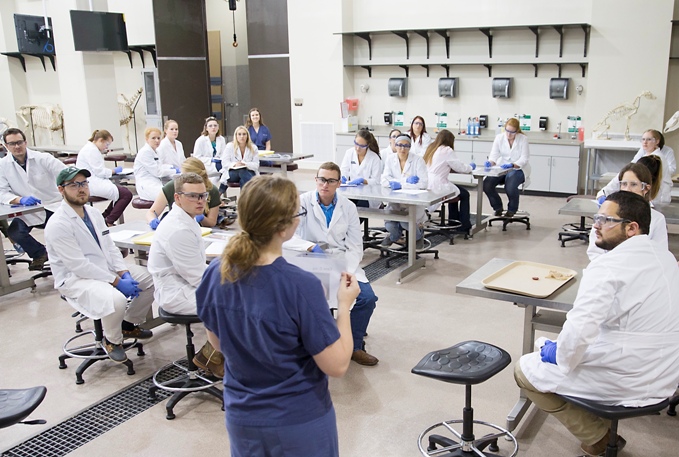 The Veterinary Medical College Application Service (VMCAS) window for prospective veterinarians seeking admission to the Class of 2024 at AAVMC member institutions opens on May 9 and closes on September 17 at 11:59 p.m.
The Veterinary Medical College Application Service (VMCAS) window for prospective veterinarians seeking admission to the Class of 2024 at AAVMC member institutions opens on May 9 and closes on September 17 at 11:59 p.m.More than 25 years old, the sophisticated centralized application service is refined every year to make it more effective for both applicants and admissions officers. Changes have been made this cycle to improve user experiences for both applicants and admissions officers, according to Director of Admissions and Recruitment Affairs Tony Wynne.
From an applicant standpoint, changes include improved program searches, increased character counts on essay prompts and the implementation of a “professional transcript entry” (PTE) feature that enables applicants to pay to have coursework entry completed.
New benefits for member institutions include a sophisticated new VMCAS Analytics program. The feature enables admissions personnel to view a graphical representation of VMCAS data in real time. For example, analysts can compare cohorts against national applicant data, they can compare current data against former cycle data, and examine graphical heat maps of where applicants are coming from on an international basis.
This cycle opens amidst a period of continued growth in the numbers of applicants to veterinary colleges and schools. Last year, a 7% increase in individuals applying to veterinary school and an overall 10% increase in the total number of applications were noted.
Detailed Data on AAVMC’s Cost Comparison Tool (CCT) Supports Financial Planning, Decision-Making
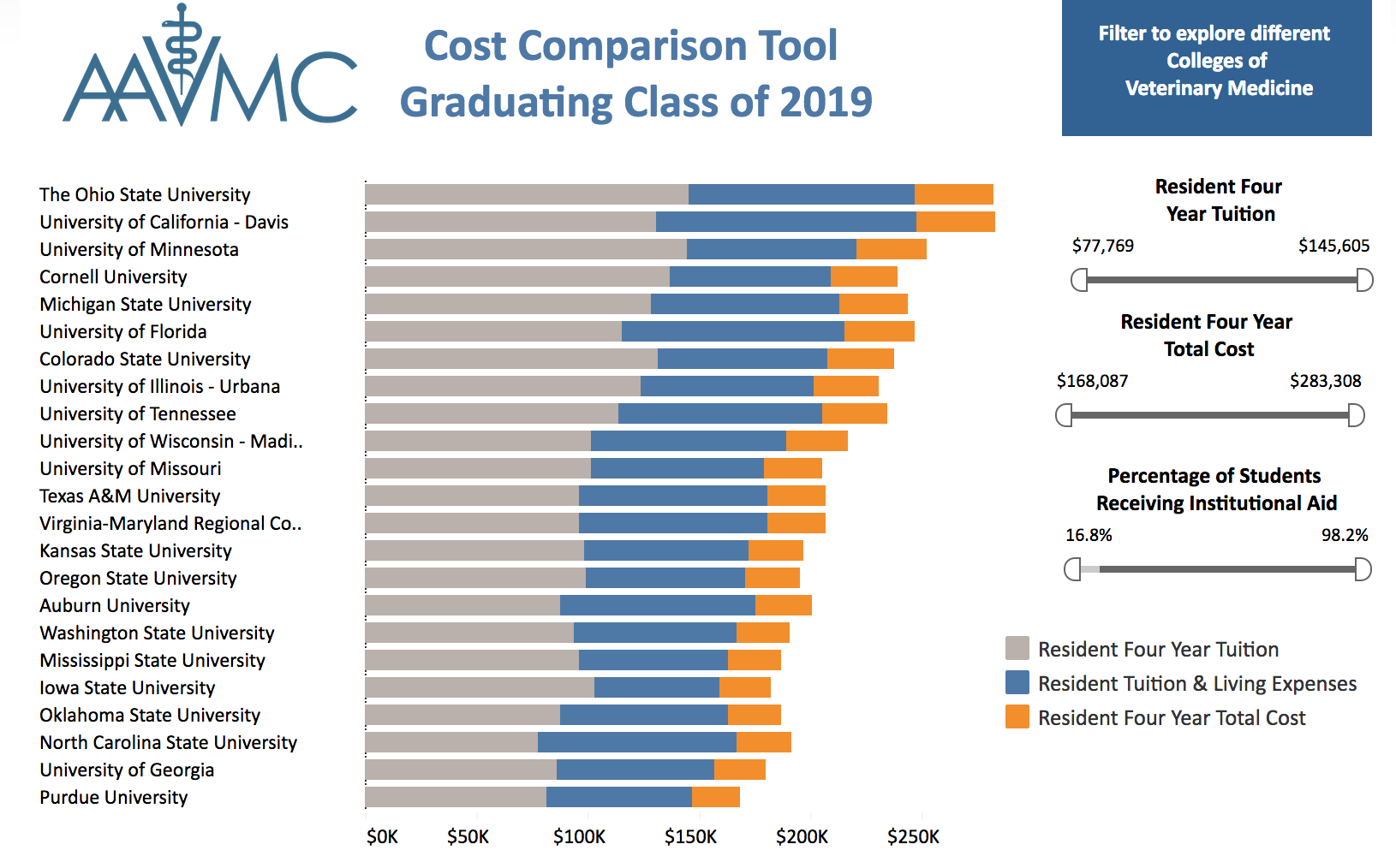 The AAVMC has introduced the newest version of its Cost Comparison Tool,
a web-based interactive program that provides visitors with detailed
information about tuition costs, scholarship resources and financing a
veterinary medical education. The database includes information on all
30 accredited U.S. schools and 12 Canadian and international colleges.
The AAVMC has introduced the newest version of its Cost Comparison Tool,
a web-based interactive program that provides visitors with detailed
information about tuition costs, scholarship resources and financing a
veterinary medical education. The database includes information on all
30 accredited U.S. schools and 12 Canadian and international colleges.“Higher education is an expensive proposition in today’s world, and educational debt has become a major national problem,” said AAVMC CEO Dr. Andrew T. Maccabe. “We’re committed to providing our applicants and students with the data they need to make informed and intelligent decisions about financing their professional education. Our CCT program is a powerful tool for helping them do that.”
The visualization presents the total cost of attendance (tuition, living expenses, and loan interest accumulation) for 2019 graduates. It includes data about whether students can establish residency for the purpose of paying discounted tuition and the average scholarship awards made to DVM students at each college.
This year’s version includes several updates and enhancements, according to AAVMC Senior Director for Institutional Research and Diversity Dr. Lisa Greenhill.
The visualization was expanded to include the total costs of earning a DVM degree for 2019 graduates and median debt levels for 2018 graduates were included. Efforts to increase visibility were also made by enlarging individual school “pop out” information on the map page, each of which provides a synopsis of data presented throughout the visualization.
A separate tab with data on 2018-2019 first-year tuition costs is also new for this year. This tab allows users to get a single-year view of tuition and project estimated total costs for new students.
Three tabs include sliders that allow users to filter the data by tuition costs, total costs and percentage of students receiving scholarship aid from the colleges.
In addition to tuition and related information, the map includes the average amount of institutional scholarship aid awarded to first year professional students, the percentage of students to whom it was awarded, the cost of living for each of the participating colleges and estimated loan interest accrued on a fully financed education.
AAVMC Assembly Approves Structural Changes in Affiliate Program
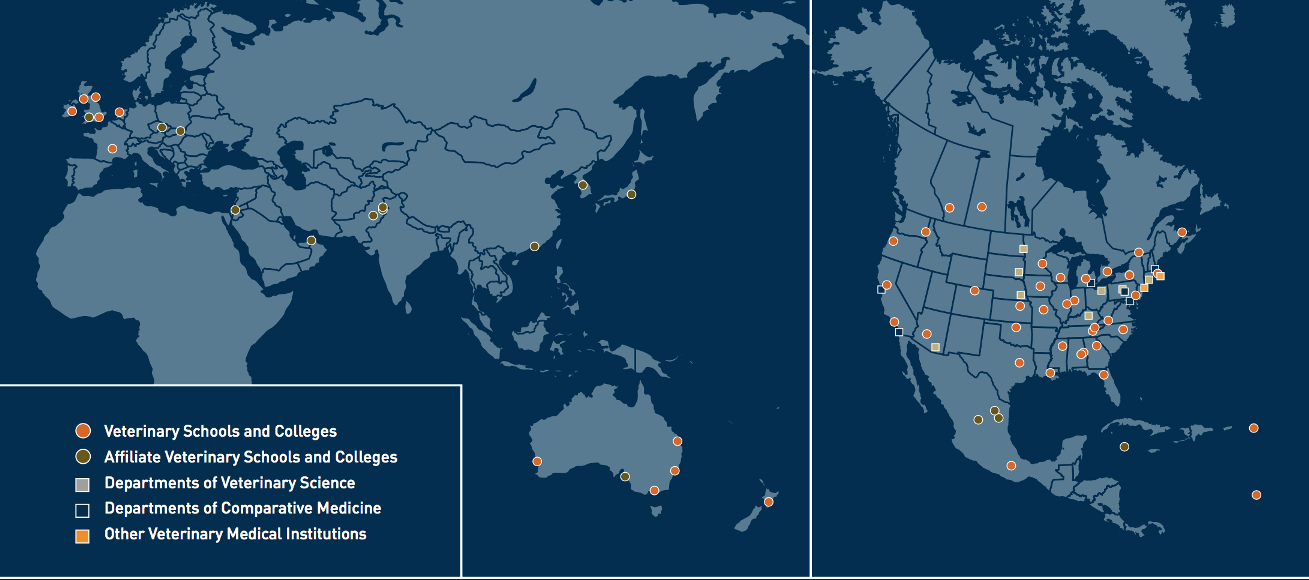
The AAVMC Assembly has approved changes to the structure of the AAVMC affiliate institution program. New categories have been created to better define the nature and aspirations of affiliate members.
“Affiliate Member” now refers to affiliate members that include departments of comparative medicine and departments of veterinary science.
“Provisional Member” refers to those colleges and schools of veterinary medicine that grant the Doctor of Veterinary Medicine (DVM) degree or equivalent and are seeking to qualify for COE accreditation, but have not yet earned “reasonable assurance” status from the COE.
“Collaborative Member” refers to any college or school of veterinary medicine outside the U.S. and Canada that is recognized by its government as a professional school of veterinary medicine and is not seeking COE accreditation.
These changes are effective July 1, 2019. For a detailed look at the qualifications and benefits associated with each membership category, please click here.
AAVMC’s 2019-2020 Leadership Academy Now Forming
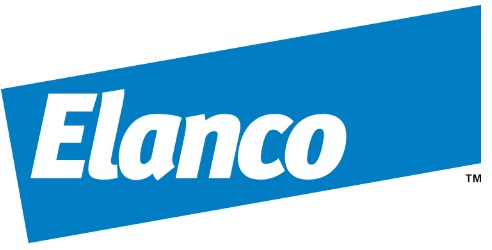 Like all organizations, colleges and schools of veterinary medicine need great leaders, people with vision who can inspire others to approach their work with meaning, purpose and resolve. The AAVMC’s Leadership Academy, sponsored by Elanco, offers a unique growth opportunity for emerging leaders in academic veterinary medicine. The nomination deadline for those interested in joining the academy’s 2019-2020 cohort is June 7, 2019.
Like all organizations, colleges and schools of veterinary medicine need great leaders, people with vision who can inspire others to approach their work with meaning, purpose and resolve. The AAVMC’s Leadership Academy, sponsored by Elanco, offers a unique growth opportunity for emerging leaders in academic veterinary medicine. The nomination deadline for those interested in joining the academy’s 2019-2020 cohort is June 7, 2019.Founded in 2012, the AAVMC launched the academy in 2012 to cultivate good leadership in academic veterinary medicine and provide a forum for building lasting ties between faculty members at veterinary schools and departments around the world.
The academy addresses how to develop effective leadership skills around the themes of communication, emotional intelligence and applied leadership skills.
Participants typically meet three times a year and are assigned to learning groups in which they work throughout the program, providing the opportunity to bond with and learn from teammates. The most recent leadership academy wrapped up in March with expert speakers and sessions that included effective advocacy, fundraising, and balancing the demands of leadership.
Previous sessions featured topics that included emotional intelligence, strategic thinking, media training and managing conflict.
Every year, Leadership Academy participants get practical advocacy experience by accompanying veterinary medical college deans to Capitol Hill to discuss pressing issues in academia and the profession with legislators and Congressional staff on Advocacy Day, just prior to the AAVMC’s annual conference.
The year’s meetings will be September 4-6, 2019, in Indianapolis, Indiana; December 5-7, 2019, in College Station, Texas; and March 3-5, 2020, in Washington, D.C.
Participation is limited to faculty and staff at AAVMC member institutions, with each member institution typically enrolling one participant who is chosen by the dean based upon demonstrated leadership or potential. Each participant’s name and email must be submitted by the dean’s office to Leslie Wilson, Program Manager at lwilson@aavmc.org no later than June 7, 2019.
Thanks to the generous support of Elanco, the AAVMC is offering enrollment in the academy with no registration fee. The only costs to the institution are travel and lodging support for the participants to attend each session.
Learn more.

AAVMC Virtual Admissions Fair June 18, 2019
The AAVMC will present a Virtual Admissions Fair for students interested in exploring admission to veterinary medical school on June 18, 2019. Participants will be able to chat online with admissions representatives from AAVMC member institutions and VMCAS representatives, learn more about the application process and compare opportunities among schools and colleges. For more information, please click here. The fair is being offered in collaboration with CareerEco, a new career “ecosystem” that leverages the power of technology and embraces innovation to serve applicants and career-seekers.Veterinary Medicine Loan Repayment Program Enhancement Act Reintroduced in Senate
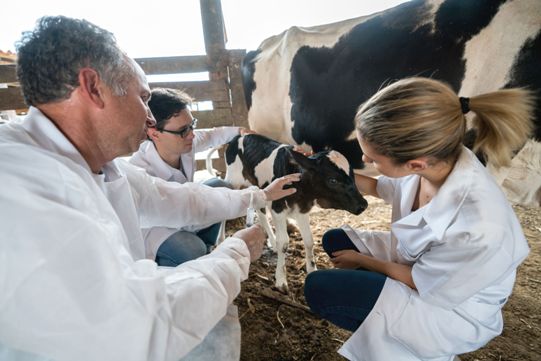 The Veterinary Medicine Loan Repayment Program Enhancement Act has been reintroduced in the Senate (S. 1163) by Senators Mike Crapo (R-Idaho) and Debbie Stabenow (D-Mich.). A top priority for both the AAVMC and the AVMA, the bill addresses shortages of food animal and public health veterinarians in rural and agricultural communities.
The Veterinary Medicine Loan Repayment Program Enhancement Act has been reintroduced in the Senate (S. 1163) by Senators Mike Crapo (R-Idaho) and Debbie Stabenow (D-Mich.). A top priority for both the AAVMC and the AVMA, the bill addresses shortages of food animal and public health veterinarians in rural and agricultural communities.The Veterinary Medicine Loan Repayment Program incentivizes veterinarians to practice in underserved areas by providing educational loan assistance in exchange for a commitment to serve in a USDA-designated veterinary shortage areas for at least three years.
In 2019, the U.S. Department of Agriculture’s National Institute of Food and Agriculture (USDA NIFA) designated 190 regions in 44 states as suffering from shortages of food animal or public health veterinarians, the most in the program’s history.
Language in the Veterinary Medicine Loan Repayment Program Enhancement Act will end a withholding tax applied to program awards and enhance program capacity. For more details, please see this article on the AVMA website.
2019 National Pet Week May 5-11
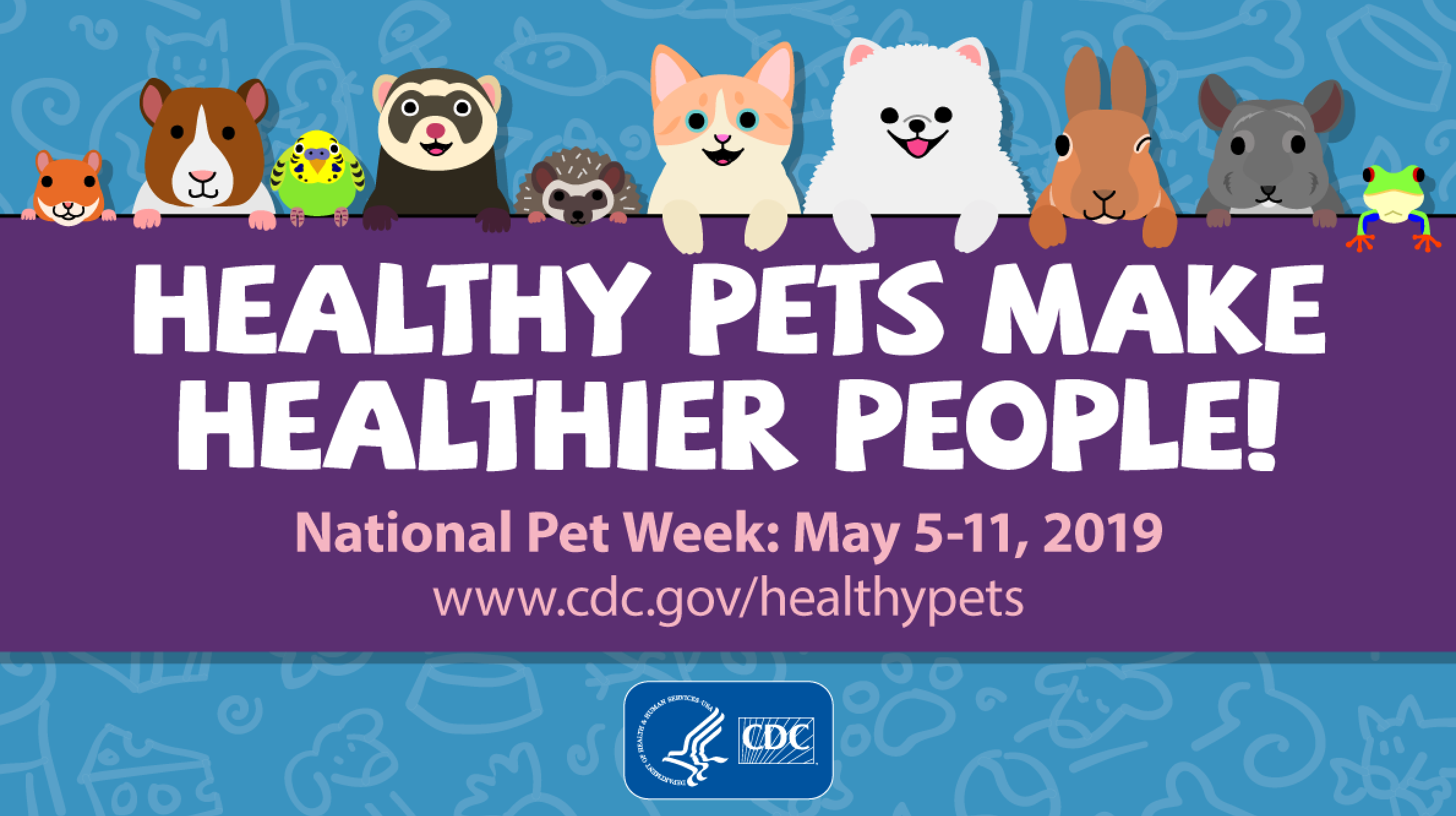 Millions of people appreciate the enormous impact of the human/animal bond. They “get” the profound benefits of pet ownership, both in terms of physiological and psychological health and wellbeing. That’s hard to quantify. But this is: the U.S. pet industry is also a vast economic enterprise that accounts for more than $100 billion in Gross Domestic Product. The National Pet Week celebration gets underway this year May 5-11.
Millions of people appreciate the enormous impact of the human/animal bond. They “get” the profound benefits of pet ownership, both in terms of physiological and psychological health and wellbeing. That’s hard to quantify. But this is: the U.S. pet industry is also a vast economic enterprise that accounts for more than $100 billion in Gross Domestic Product. The National Pet Week celebration gets underway this year May 5-11.
National Pet Week was created by the AVMA in 1981 to recognize, foster and celebrate the human/animal bond. You can click here to learn more about their celebration. The AVMA works closely with members practicing in communities around the country to coordinate this national celebration.
The theme of the AVMA’s “National Pet Week” this year is “Give Them a Lifetime of Love.” The AVMA has also selected sub-themes for each day of National Pet Week:
- Sunday—Choose well. Commit for life.
- Monday—Socialize now. New doesn’t have to be scary.
- Tuesday—Exercise body. Exercise mind.
- Wednesday—Love your pet? See your vet!
- Thursday—Pet population control: Know your role
- Friday—Emergencies happen. Be prepared.
- Saturday—Give them a lifetime of love.
2019 Primary Care Veterinary Educators’ Symposium September 12-15 in Pullman, Washington
 The 2019 Primary Care Veterinary Educators’ Symposium will be held September 12-15 in Pullman, Washington. The biennial meeting is designed to provide an opportunity for primary care veterinary educators to network, generate ideas and develop new skills. A variety of presentations and workshops, as well as ample opportunities for networking and socializing, are planned. Additional information on the program, as well as a registration website, will be available soon.
The 2019 Primary Care Veterinary Educators’ Symposium will be held September 12-15 in Pullman, Washington. The biennial meeting is designed to provide an opportunity for primary care veterinary educators to network, generate ideas and develop new skills. A variety of presentations and workshops, as well as ample opportunities for networking and socializing, are planned. Additional information on the program, as well as a registration website, will be available soon.2019 National Veterinary Scholars Program July 25-28 in Massachusetts
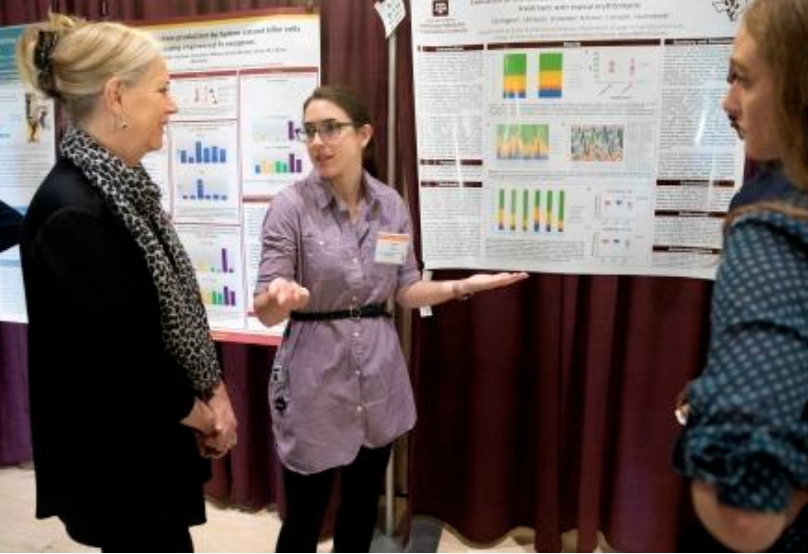 The 2019 National Veterinary Scholars Symposium will be held from July 25-28, 2019 at Worcester State University in Worcester, Massachusetts. Please note this official new date supersedes a date that was previously announced.
The 2019 National Veterinary Scholars Symposium will be held from July 25-28, 2019 at Worcester State University in Worcester, Massachusetts. Please note this official new date supersedes a date that was previously announced.The NVSS is widely considered the premier annual scientific colloquium showcasing research accomplishments by veterinary students who are completing summer research internships. The symposium highlights the ways veterinary scientists advance basic and applied research to support global health and serves as an incubator for many students who pursue careers in scientific research.
Worcester State University is located five miles from the Cummings School of Veterinary Medicine at Tufts University in Grafton, and can be easily reached by commuter train and buses from Boston.
More details and a registration website will be installed soon.
Federal One Health Zoonotic Disease Prioritization Workshop Report Published, Available
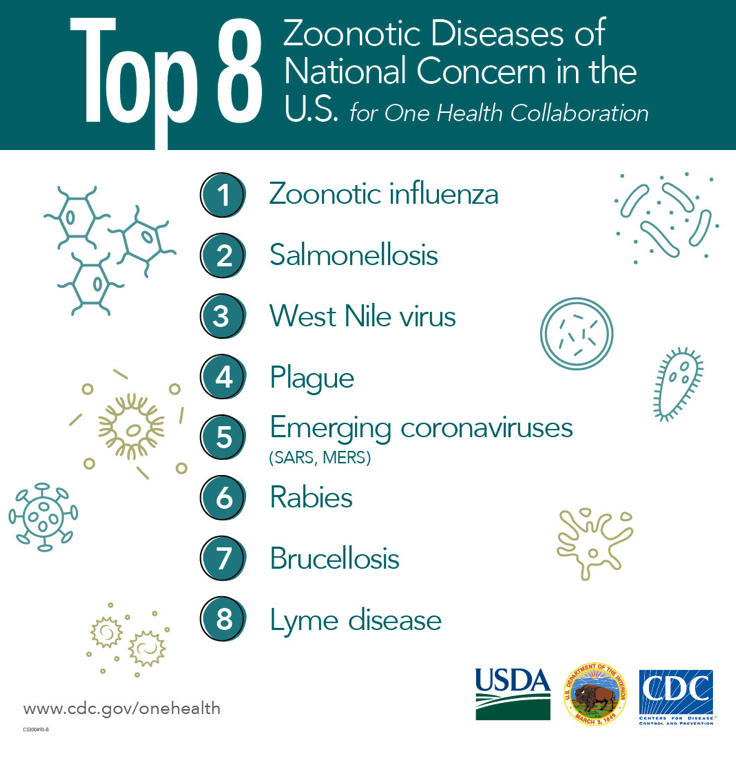 The Centers for Disease Control (CDC) has posted the final workshop report from a U.S. One Health Zoonotic Disease Prioritization Workshop jointly hosted by the CDC, the U.S. Department of the Interior (DOI), and the U.S. Department of Agriculture (USDA).
The Centers for Disease Control (CDC) has posted the final workshop report from a U.S. One Health Zoonotic Disease Prioritization Workshop jointly hosted by the CDC, the U.S. Department of the Interior (DOI), and the U.S. Department of Agriculture (USDA).During this workshop, participants from each of these agencies voted on a list of priority zoonotic diseases to be jointly addressed by human, animal, and environmental health sectors in relevant U.S. federal agency programs using a multi-sectoral, One Health approach. This was the first time multiple government agencies in the United States worked together to prioritize zoonotic diseases of national concern and is a critical step towards developing a coordinated U.S.-specific approach to One Health.
Participants identified eight zoonotic diseases as priorities using a semi-quantitative selection tool, the One Health Zoonotic Disease Prioritization (OHZDP) tool, which was developed by the CDC. Participants then used components of the One Health Systems Mapping and Analysis Resource Toolkit (OH-SMARTTM), which was co-developed by the USDA and the University of Minnesota, to review and visualize the One Health system currently in place.
The detailed workshop report outlines the process, the resulting list of prioritized zoonotic diseases, and discussions and recommendations by the participants concerning how to work together to address the diseases and strengthen One Health in the United States. To download the entire report, please click here.
Boehringer Ingelheim Scholarship Deadline
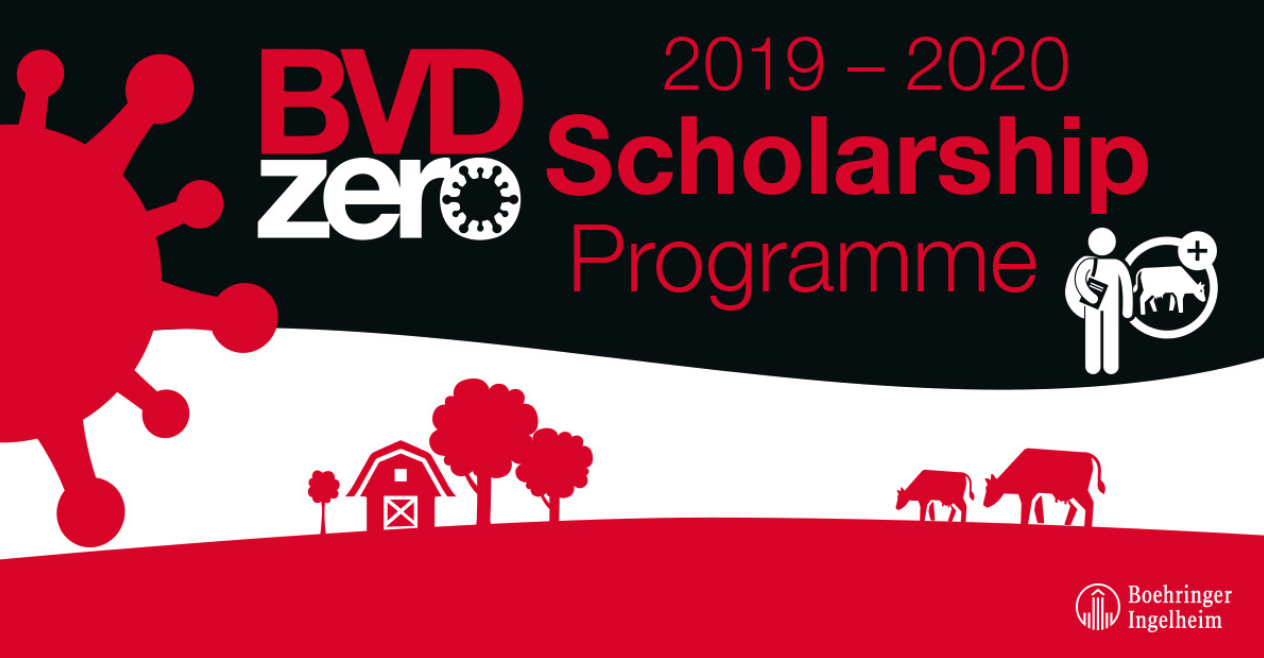 Bovine Diarrheal Disorder is the most common infectious disease of cattle and causes enormous economic loss. As part of Boehringer Ingelheims’s BVDZero program, they are trying to increase DVM student awareness about the problem and are offering a global student scholarship program. Each year, ten 1,000 euro scholarships will be awarded, and recipients will also receive conference registration for the 2020 World Buriatrics Conference in Madrid, Spain.
Bovine Diarrheal Disorder is the most common infectious disease of cattle and causes enormous economic loss. As part of Boehringer Ingelheims’s BVDZero program, they are trying to increase DVM student awareness about the problem and are offering a global student scholarship program. Each year, ten 1,000 euro scholarships will be awarded, and recipients will also receive conference registration for the 2020 World Buriatrics Conference in Madrid, Spain. Applicant qualifications include status as a second, third or fourth-year veterinary student who exhibits a passion for livestock and the cattle industry. Academic excellence and leadership in extracurricular activities are also considered. The application deadline is May 25. For more information, click here.
In the News
Study: Vaccines Could Prevent Cancer in Dogs, Eventually HumansAssociated Press (AP)
Gray Whales are Starving to Death in the Pacific, and Scientists Want to Know Why
Los Angeles Times
Cornell to Offer New Veterinary Business Program
Veterinary Practice News
Researchers Target Cattle Anaplasmosis with USDA Grant
USAgnet
Now Here’s a Special Breed – Auburn Dogs Help Combat Terrorism
Greensboro News & Record
Key Similarities Between OA in Dogs and Humans Identified for First Time
Vet Times
Diversity and Inclusion in the Mix
Association Conventions and Facilities
ETSU and Virginia Tech Establish New Opioid Research Consortium of Central Appalachia
Johnson City Press
Alastair Cribb Named Dean of Cummings School of Veterinary Medicine at Tufts University
The Telegram
Mariani Appointed Director of Strategic Initiatives at AAVMC
WATTAgnet
Preventing Triple Negative Breast Cancer from Spreading
Medical Xpress
Three International Programs Awarded CIVME Research Grants
Veterinary Practice News
Yorkshire Terrier’s Leg Bones Regrown by UC Davis Surgeons Following a Severe Nonunion Fracture
Today’s Veterinary Practice
AAVMC Keeps Focused on Inclusion
JAVMA
Risk of Congenital Zika Syndrome Greater Than Thought
USAgnet
Chemotherapy Helps Horses With Lymphoma
The Horse
Biological Sciences Undergraduate First ASU Online Student Admitted to Veterinary School
ASU
Service Dogs Can Help Veterans with PTSD
Greensboro Daily News
Auburn University Researchers Recognized for Innovative Ideas
Alabama News Center
From Our Members
Simulation-based Education Builds Confidence and Skills in CVM Students
Washington State
Kansas State
Clams and Water Pumping Explain Phytoplankton Decline in San Francisco Estuary
UC Davis
Virginia Tech Researchers Join Global Effort to Develop a New Vector Control Strategy to Prevent Malaria
Virginia-Maryland
LSU SVM Assistant Professor Receives $2.7 Million Outstanding New Environmental Scientist (ONES) Award to Investigate Molecular Mechanisms of Ozone-induced Lung diseases
Louisiana State
Penn Vet’s Ryan Hospital Opens Its New $2.7 Million Emergency Room
University of Pennsylvania
Texas A&M CVM Team Receives Funding To Continue Project Securing Health Of DHS Working Dogs
Texas A&M
To see a news feed featuring breaking news from our member institutions, please click here.
People in Motion
The Cummings School of Veterinary Medicine at Tufts University has named Dr. Alastair E. Cribb as its fifth dean. Dr. Cribb, who is the founding dean of the University of Calgary Faculty of Veterinary Medicine (UCVM), will begin in this role on July 15, 2019.Dr. Trevor Ames, dean of the University of Minnesota College of Veterinary Medicine, will step down as dean on August 5 to accept an appointment as associate vice president for academic health sciences in the Office of the Executive Vice President and Provost.
“Like” us on Facebook or follow us on Twitter:




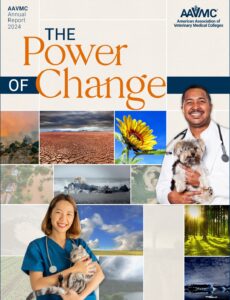
SHARE